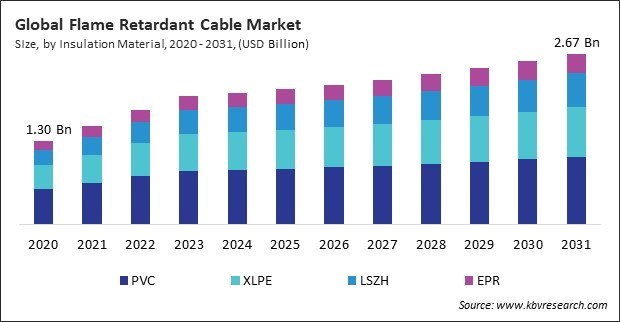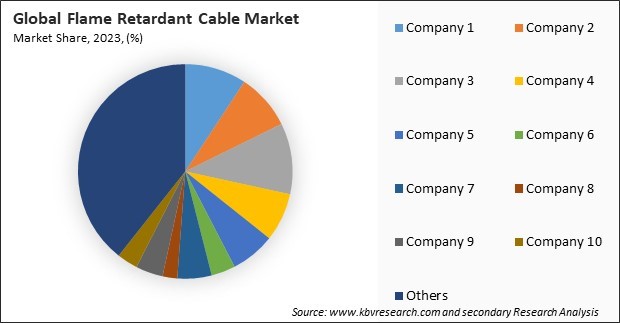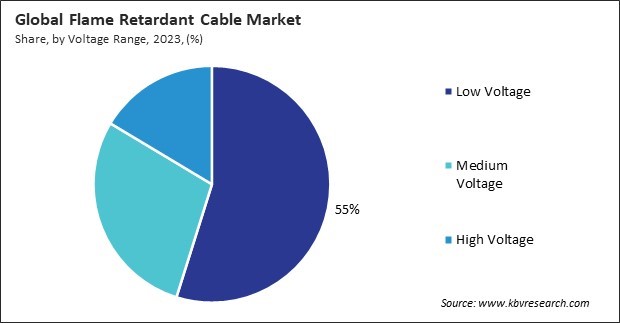“Global Flame Retardant Cable Market to reach a market value of USD 2.67 Billion by 2031 growing at a CAGR of 3.8%”
The Global Flame Retardant Cable Market size is expected to reach $2.67 billion by 2031, rising at a market growth of 3.8% CAGR during the forecast period.
The North America segment acquired 37% revenue share in the market in 2023. These cables are in high demand in energy, automotive, and building construction sectors, driven by strict regulatory compliance and the need for fire-safe solutions. In addition, the region has experienced an increase in the use of these cables because of the expanding use of green energy sources and the modernization of power grids.

Urbanization is accelerating globally, with UN-Habitat reporting that 55% of the world’s population lived in urban areas in 2018, a figure expected to rise to 68% by 2050. This rapid shift towards urban living demands significant investments in infrastructure to meet the growing needs of densely populated areas. Projects such as housing, transportation systems, and utilities are becoming crucial, and these cables are integral to these developments. Hence, these developments will drive the expansion of the market.
Additionally, The global demand for these cables is being driven by the implementation of more stringent fire safety standards in the residential, commercial, and industrial sectors. Governments and regulatory authorities are mandating fire-resistant materials in electrical systems to prevent fire spread and reduce risks. In the European Union, the Construction Products Regulation (CPR) categorizes cables based on fire performance, ensuring compliance in countries like Germany and France. Thus, these cables are becoming a cornerstone of safer urban and industrial environments, ensuring compliance with modern fire safety standards while protecting lives and property.
However, these cables are essential for ensuring safety in various industries, as they are designed to minimize fire risks. However, their adoption is hindered by the high costs of the materials used in their production. Specialized materials, such as halogen-free compounds, are necessary to enhance fire resistance and reduce toxic fume emissions during combustion. These materials are substantially more expensive than conventional alternatives, which results in an increase in production costs. Hence, these factors may hamper the expansion of the market.

The leading players in the market are competing with diverse innovative offerings to remain competitive in the market. The above illustration shows the percentage of revenue shared by some of the leading companies in the market. The leading players of the market are adopting various strategies in order to cater demand coming from the different industries. The key developmental strategies in the market are Acquisitions, and Partnerships & Collaborations.
Based on insulation material, the market is classified into EPR, LSZH, PVC, and XLPE. The EPR segment procured 11% revenue share in the market in 2023. The EPR (Ethylene Propylene Rubber) segment is propelled by its unique flexibility, heat resistance, and electrical insulation properties, making it ideal for challenging environments such as marine, oil & gas, and heavy industrial sectors. Its ability to perform reliably under high temperatures and mechanical stress drives its adoption in applications requiring robust and adaptable cables.
On the basis of voltage range, the market is divided into low voltage, medium voltage, and high voltage. The medium voltage segment recorded 29% revenue share in the market in 2023. These cables are indispensable for transmitting electricity efficiently across utilities, substations, and industrial facilities. The rising demand for reliable energy solutions in large-scale infrastructure projects and the modernization of power grids are key drivers for the medium voltage segment.

By application, the market is segmented into automotive & transportation, building & construction, energy, manufacturing, and others. The energy segment garnered 23% revenue share in the market in 2023. These cables are critical in minimizing fire risks and ensuring the reliable operation of energy infrastructure. The demand for these cables in energy initiatives has increased as a result of the global transition to renewable energy sources, such as solar and wind power.
Free Valuable Insights: Global Flame Retardant Cable Market size to reach USD 2.67 Billion by 2031
Region-wise, the market is analyzed across North America, Europe, Asia Pacific, and LAMEA. The Asia Pacific segment procured 30% revenue share in the market in 2023. The region's rapid industrialization, urbanization, and substantial infrastructure development initiatives are key factors contributing to its dominance. Countries like China, India, and Japan are witnessing increased investments in construction, energy, and manufacturing sectors, driving the demand for these cables.
| Report Attribute | Details |
|---|---|
| Market size value in 2023 | USD 2.01 Billion |
| Market size forecast in 2031 | USD 2.67 Billion |
| Base Year | 2023 |
| Historical Period | 2020 to 2022 |
| Forecast Period | 2024 to 2031 |
| Revenue Growth Rate | CAGR of 3.8% from 2024 to 2031 |
| Number of Pages | 245 |
| Number of Tables | 380 |
| Report coverage | Market Trends, Revenue Estimation and Forecast, Segmentation Analysis, Regional and Country Breakdown, Market Share Analysis, Porter’s 5 Forces Analysis, Company Profiling, Companies Strategic Developments, SWOT Analysis, Winning Imperatives |
| Segments covered | Insulation Material, Voltage Range, Application, Region |
| Country scope |
|
| Companies Included | Yazaki Corporation, Nexans S.A., Prysmian Group, Belden, Inc., Sumitomo Electric Industries, Ltd., Havells India Ltd., Amphenol Corporation (Amphenol Industrial Products Group), Jainflex Cables Pvt. Ltd., HELUKABEL GmbH, and Top Cable S.A |
By Insulation Material
By Voltage Range
By Application
By Geography
This Market size is expected to reach $2.67 billion by 2031.
Rapid Urbanization And Infrastructure Development are driving the Market in coming years, however, Competition From Low-Cost Alternatives restraints the growth of the Market.
Yazaki Corporation, Nexans S.A., Prysmian Group, Belden, Inc., Sumitomo Electric Industries, Ltd., Havells India Ltd., Amphenol Corporation (Amphenol Industrial Products Group), Jainflex Cables Pvt. Ltd., HELUKABEL GmbH, and Top Cable S.A
The expected CAGR of this Market is 3.8% from 2024 to 2031.
The Low Voltage segment led the maximum revenue in the Market by Voltage Range in 2023, thereby, achieving a market value of $1.4 billion by 2031.
The North America region dominated the Market by Region in 2023, and would continue to be a dominant market till 2031; thereby, achieving a market value of $948.7 Million by 2031.
Our team of dedicated experts can provide you with attractive expansion opportunities for your business.

 Drivers
Drivers
 Restraints
Restraints
 Opportunities
Opportunities
 Challenges
Challenges
